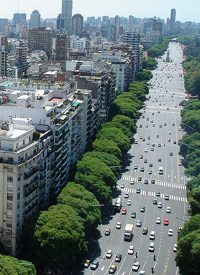
For a peek at where debt-ridden America may be headed, look no further than modern-day Argentina.
South America’s second-largest country in many ways resembles our own. Like the United States, Argentina lies mostly outside the climatic extremes of the tropics and the polar regions. Blessed with a varied topography, Argentina has robust natural resources and world-class agriculture. Like the United States, Argentina is a melting pot for immigrant peoples as diverse as Boers, English, Italians, and Basques, in addition to Hispanics. Argentines are among the world’s most patriotic people and her culture among the most vital in Latin America. With a solid work ethic, top-notch educational standards, and a modern professional class, Argentina is a far cry from the “banana republics” and cocaine fiefdoms so typical of large swaths of Latin America.
As a teenage exchange student in Argentina in the late ’70s, when the country was ruled by a military junta, I was appalled at the levels of inflation evident even then. At the time I had no idea where inflation came from, but it was astonishing to see prices rising weekly at the store where I spent my monthly allowance. Few people deposited their money in banks; the wealthiest people I knew all put all their money into commodities and real estate, since it was impossible to save any nest egg.
Since then, the problem has grown immeasurably worse. An episode of Zimbabwe-esque hyperinflation in the early 1980s following the loss of the Falklands War with Great Britain triggered an economic and political collapse from which the country has never really recovered. A decade ago Argentina, unable to pay her debts any longer, defaulted on her obligations to the IMF, leading to another collapse and a horrific crime wave. In an attempt to stabilize her economy, the government devalued the peso in 2001, causing Argentines to lose two-thirds or more of their money assets overnight.
After a few years of calm, things are once again spiraling out of control. Despite debt restructuring, Argentina is still insolvent. And things have come to what they always must when the piper has to be paid: higher taxes and still more inflation. Although the latter is running at a (for Argentina) comparatively benign rate of around 25 percent a year, Argentines no longer trust the banks and transact as much business as possible in cash, preferably a more stable foreign currency like U.S. dollars. Because Argentines now routinely carry thousands of dollars in cash, the country is now reeling from another awful crime wave, one which has accounted for almost 5,000 armed robberies already this year. All over the country, gangs of ruthless criminals watch for people cleaning large sums of money out of bank accounts and then rob them, often shooting their victims in the process.
Fear of inflation and currency devaluation isn’t the only thing spurring Argentines to transact their business in cash. The other is the voracious tax man, who now confiscates more than half of all money earned in Argentina — if the money can be tracked. “Of every 100 pesos you make, 65 you owe to the state through various taxes,” Buenos Aires notary Ponciano Vivanco observed to the Associated Press. “That is why there is so much of this underground economy.” Ponciano believes that 90 percent of Buenos Aires’ real estate is purchased in cash.
And the Argentina government, hard-pressed by its many creditors to keep making payments on its debts, never wearies of devising more creative forms of taxation. There’s a 21 percent sales tax, a tax on bank transactions, a “stamp tax” on contracts, and a wealth tax on property assessed annually, for example. Such measures have encouraged a culture of cavalier tax evasion and brought about the sprawling underground cash economy that is proving such a windfall for the criminal class.
All of Argentina’s woes have their roots in misbegotten policies inaugurated decades ago by Juan Peron and his fellow “social reformers.” Peron, like Franklin D. Roosevelt, never saw a social problem that he did not believe could be fixed by the creative application of government power — financed, of course, by taxation. Much of the socialist legislation he and his successors enacted continues to eat away Argentina’s remaining wealth, transforming a country that a century ago had one of the world’s strongest economies into a basket case rivaling Zimbabwe or any other of the long, sad parade of nations whose rulers have spent them into bankruptcy.
This, in the not-so-long run, will be the fate of the United States if it continues to make many of the same mistakes Argentina has made. The problem with such policies is that, by the time their full effect is felt, those who promulgated them in the first instance are often long dead and canonized. Just as few Americans today understand the responsibility FDR bears for the mess we’re in, many Argentines continue to idolize Peron and ascribe their current woes to latter-day vices. So Argentina continues to reap the whirlwind of runaway inflation, high taxes, and civil unrest, even as the political and civic will to change the entrenched ways of generations past has long since departed.
For America, such an outcome is likely but by no means inevitable, any more than Argentina was compelled two or three decades back to continue failed policies rather than enact meaningful reforms that would have allowed this generous, hardworking people to revitalize their nation and pay down their national debt. But changing course requires truly inspired leadership coupled with considerable national will. Whether America will muster the will to do what must be done before the evil day becomes irrevocable — reduce the size and cost of government by 50 percent or more, and do away with the tangle of unnecessary regulations that are stifling innovation and capital formation — may become our greatest test yet of national character.
Photo: Buenos Aires



